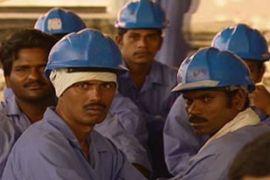Burj Dubai owners say strike over
Arabtec says agreement with workers reached but strike leaders remain silent.

On November 1, the UAE’s labour ministry hailed an end to the strike action following a site visit involving officials from the labour ministry and the Dubai police as well as an Indian consular representative.
But six days later Arabtec acknowledged that just 1,500 of its staff had returned to work.
Burj Dubai, which overtook Taiwan’s Taipei 101 tower as the world’s tallest building when it reached 512 metres (1,533 feet) in June, is just one of the construction projects in which Arabtec is involved.
Construction of the skyscraper by a consortium involving Arabtec, Samsung of South Korea and Besix of Belgium is not yet complete and its final height is a closely guarded secret.
Boom town
| In video |
Dubai is in the midst of a massive construction boom as it seeks to position itself as a business and leisure hub in the face of dwindling oil wealth.
An estimated 700,000 Asians, mostly from India, Pakistan and Bangladesh, work as construction workers in the UAE, where only around 20 per cent of the four million population have citizenship.
Strike action is outlawed and trade unions are illegal in the country, but thousands of migrant workers downed tools in a rash of strikes in Dubai late last month.
Arabtec staff, who are paid an average of 700 dirhams (US$190) a month, have been demanding an increase of 500 dirhams (US$136) as well as improvements in hostel accommodation and transport to and from their workplaces.
Burj Dubai is no stranger to industrial action. In March last year, 2,500 labourers rioted at the construction site.
The incident prompted the New York-based Human Rights Watch to issue a statement calling on the UAE government to “end abusive labour practices” and describing working conditions as “less than human.”
In November last year, Dubai’s emir, Sheikh Mohammed bin Rashid al-Maktoum, who is also UAE vice president and prime minister, ordered sweeping measures to improve the working conditions of migrant labourers.
In the face of the new industrial action, the authorities have issued a series of warnings to employers to ensure that last year’s decree is enforced.
